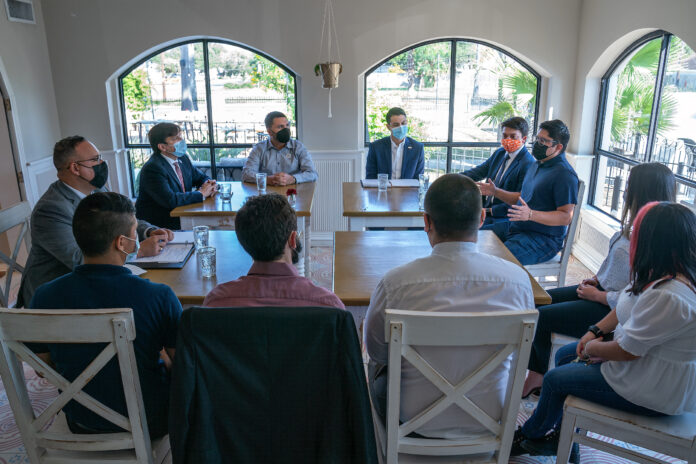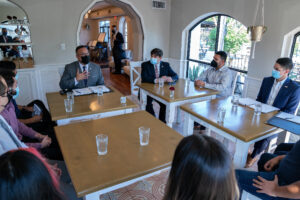
McALLEN — A conversation between U.S. Education Secretary Miguel Cardona and a group of Rio Grande Valley college students last week focused primarily on federal funds for higher education and pandemic response, and the importance those funds have in the tip of Texas.

UTRGV Photo by Paul Chouy
Cardona was in the Valley last week to talk about President Joe Biden’s “Build Back Better” agenda. He spent the first part of the afternoon touring a high school campus in San Juan before meeting a group of students from the University of Texas Rio Grande Valley at Salome on Main, where he discussed the president’s agenda.
The secretary was accompanied by U.S. Rep. Vicente Gonzalez, D-McAllen, at both stops.
Although Cardona may nominally have been in town to talk to those college students about what’s happening in Washington, he proved for much of the conversation to be just an avid listener as he was a speaker.
Students told him about the ups and downs of being a student in the Valley, often relating intimate stories about struggles with paying for higher education and challenges posed by the pandemic.
Alyssa Trejo, 18, is studying English at UTRGV and minoring in legal studies.
She’s a planner and a fiscally strategic collegiate; she’d like to be a lawyer in the long run, but she’s planning on teaching for a time first to put her in a sound financial position to pursue a JD.
Despite that attitude, Trejo says without affordable education initiatives from the federal government, her collegiate plans or her parents’ financial situation may have been put in jeopardy.
“That’s what so many students want down here,” she said. “I mean, that was my goal, to alleviate the debt that my parents most likely would’ve gone into had I not had the scholarships and the funding available from UTRGV and the federal government.”
The administration’s agenda aims to include community access for all and Pell grants, Cardona said, something he said should help young people avoid the worry of plunging their parents into debt.
“I know too many students that decided in middle school, college is not for them because they don’t want to put a burden on their parents,” he said.
The pandemic seemed to be the biggest concern for many students at the table. They told Cardona about how it had affected them, or their friends and family members.
One told him about how pleased she was that the university notified students about positive cases on campus and provided remote learning options. She told him how displeased she was that that isn’t the case for students at Valley high schools and middle schools.
Cardona said the administration and its agenda take the pandemic seriously. He said part of the agenda allocates money for college students who’ve become disengaged during the pandemic and is meant to help them finish their studies.
“I don’t have to tell you that (for) Black and brown families, the impact of COVID is greater. I don’t have to tell you that the mortality rate is greater,” Cardona said. “So when we talk about safely reopening schools, we have to make sure we’re keeping them safe and putting in the practices that we know work.”
Reopening schools safely was a priority for Gonzalez as well. He says the Build Back Better agenda will help make that happen and address pandemic concerns voiced by students at the discussion.
“You got to see it live there,” he said. “They’re actually living it.”
Trejo, the student who plans on being a lawyer, says she hopes the talk resonated with Cardona and Gonzalez. Valley students can do anything, she said, with a little help from Washington.
“I really want them to return with a sense of how strong the spirit in the Valley is, and how if given the opportunity, students will exceed any expectations of what is down here in the Valley,” she said. “If having affordable education and having these opportunities available, the students here will rise up and do the best possible with every opportunity given.”



